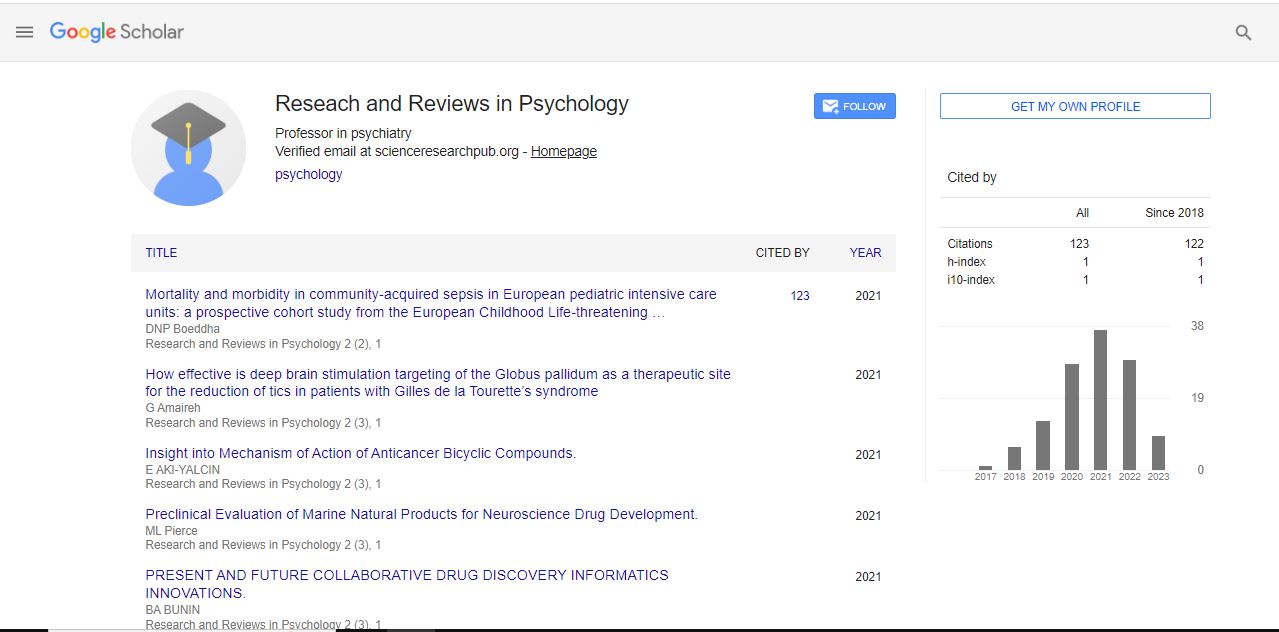Short Communication, Res Rev Phys Vol: 4 Issue: 3
An Overview on Clinical Neuropsychology and its Advancements
Risse Smith*
1Department of Neurology, University of Minnesota, Minneapolis, USA
*Corresponding Author: Risse Smith,
Department of Neurology, University of
Minnesota, Minneapolis, USA
E-mail: smith.r@gmail.com
Received date: 02 September, 2023, Manuscript No. RRPY-23-117693;
Editor assigned date: 04 September, 2023, PreQC No. RRPY-23-117693 (PQ);
Reviewed date: 18 September, 2023, QC No. RRPY-23-117693;
Revised date: 25 September, 2023, Manuscript No. RRPY-23-117693 (R);
Published date: 05 October, 2023 DOI: 10.4172/rrpy.1000344.
Citation: Smith R (2023) An Overview on Clinical Neuropsychology and its Advancements. Res Rev Phys 4:3.
Description
Neuropsychology is an informative and interdisciplinary field that examines into the complicated relationship between the human brain and behavior. It seeks to comprehend the various elements of cognition, emotion, and behavior is permanently associated with the structure and function of the brain. Neuropsychology is a specialized branch of psychology that investigates the relationship between the brain and behavior. It generates from neurology, psychology, and cognitive science to explore how damage or dysfunction in the brain can influence an individual's cognitive and emotional functioning.
Clinical Neuropsychology
Clinical neuropsychology plays an important role in the assessment, diagnosis, and treatment of individuals with neurological or psychological conditions. Some important aspects of clinical neuropsychology include:
Assessment: Clinical neuropsychologists use a number of tests to evaluate cognitive and emotional functioning. These assessments can help to diagnose conditions such as Alzheimer's disease, traumatic brain injury, and Attention Deficit Hyperactivity Disorder (ADHD).
Diagnosis: A precise diagnosis is essential for treatment planning. Clinical neuropsychologists work closely with other healthcare professionals to provide a comprehensive understanding of an individual's condition.
Rehabilitation: In cases of neurological injury, clinical neuropsychologists help individuals recover or adapt to their condition. This may involve developing techniques to deal with memory problems or improving executive functioning.
Mental health: Clinical neuropsychology also extends to mental health conditions. Neuropsychological assessments can provide insights into conditions such as depression, anxiety, and schizophrenia.
Brain-behavior relationships
Neuropsychology has provided valuable insights into the complicated relationships between the brain and behavior. Here are a few examples:
Language processing: The study of individuals with language impairments, such as aphasia, has revealed that specific brain regions, such as Broca's area and Wernicke's area, plays an important roles in language production and comprehension.
Emotion and the amygdala: Research on individuals with damage to the amygdala has shown that this brain structure is essential for processing emotional information and plays an important role in emotional regulation.
Executive functions and the frontal lobes: The frontal lobes are implicated in executive functions, such as decision-making, planning, and impulse control. Patients with frontal lobe damage may exhibit poor judgment and difficulties in social and occupational functioning.
Conditions studied in neuropsychology
Clinical neuropsychologists work with a wide range of neurological and psychological conditions. Some of the significant conditions are:
Traumatic Brain Injury (TBI): Individuals who have sustained head injuries, such as concussions or more severe traumatic brain injuries, may exhibit cognitive and emotional impairments that require assessment and rehabilitation.
Stroke: Strokes can result in damage to specific brain areas, leading to motor and sensory deficits, speech problems, and cognitive impairments. Neuropsychological assessment is essential in stroke rehabilitation.
Dementia: Conditions such as Alzheimer's disease, which lead to progressive cognitive decline, are a significant focus in clinical neuropsychology. Early diagnosis and ongoing assessment are essential for effective management.
Attention Deficit Hyperactivity Disorder (ADHD): Neuropsychological assessments can help to diagnose and understand the cognitive impairments associated with ADHD, guiding treatment and support techniques.
Epilepsy: Neuropsychologists frequently work with individuals who have epilepsy, especially when the condition impacts memory and cognitive functioning. They may evaluate the effects of antiepileptic medications on cognitive performance.
Psychiatric conditions: Neuropsychological assessments are used in the evaluation of various psychiatric conditions, such as depression, schizophrenia, and bipolar disorder, to better understand the cognitive and emotional aspects of these conditions.
Advancements in neuropsychology
Neuropsychology is an evolving field, and ongoing research continues to provide a little visibility on the mind-brain connection. Some advancement includes:
Neuroimaging: Advances in neuroimaging techniques, such as Functional Magnetic Resonance Imaging (FMRI) and Positron Emission Tomography (PET), provide insights into brain functioning in real time. These technologies allow researchers to study brain activity and connectivity patterns associated with various cognitive and emotional processes.
Personalized medicine: The field is increasingly moving towards personalized medicine, tailoring treatments and interventions based on an individual's neuropsychological profile. This technique is especially valuable in conditions such as ADHD and depression.
References
- Polich J, Criado JR (2006) Neuropsychology and neuropharmacology of P3a and P3b. Int J Psychophysiol 60(2): 172-185.
[Crossref] [Google Scholar] [PubMed]
- Previc FH (1998) The neuropsychology of 3-D space. Psychol Bull 124(2):123.
[Crossref] [Google Scholar] [PubMed]
- Walsh KW (1978) Neuropsychology: A clinical approach. Churchill Livingstone.
- Zillmer EA, Spiers MV (2001) Principles of neuropsychology. Wadsworth/Thomson Learning.
- Beaumont JG (2008) Introduction to neuropsychology. Guilford Press.
- McCarthy RA, Warrington EK (1990) Cognitive neuropsychology: A clinical introduction.
- Andrewes D (2015) Neuropsychology: From theory to practice. Psychology Press.
- Shallice T (1988) From neuropsychology to mental structure. Cambridge University Press.
- Heilman MK, Valenstein E (2010) Clinical neuropsychology. Oxford University Press.
- Squire LR (1982) The neuropsychology of human memory. Annu Rev Neurosci 5(1):241-273.
[Crossref] [Google Scholar] [PubMed]
 Spanish
Spanish  Chinese
Chinese  Russian
Russian  German
German  French
French  Japanese
Japanese  Portuguese
Portuguese  Hindi
Hindi 